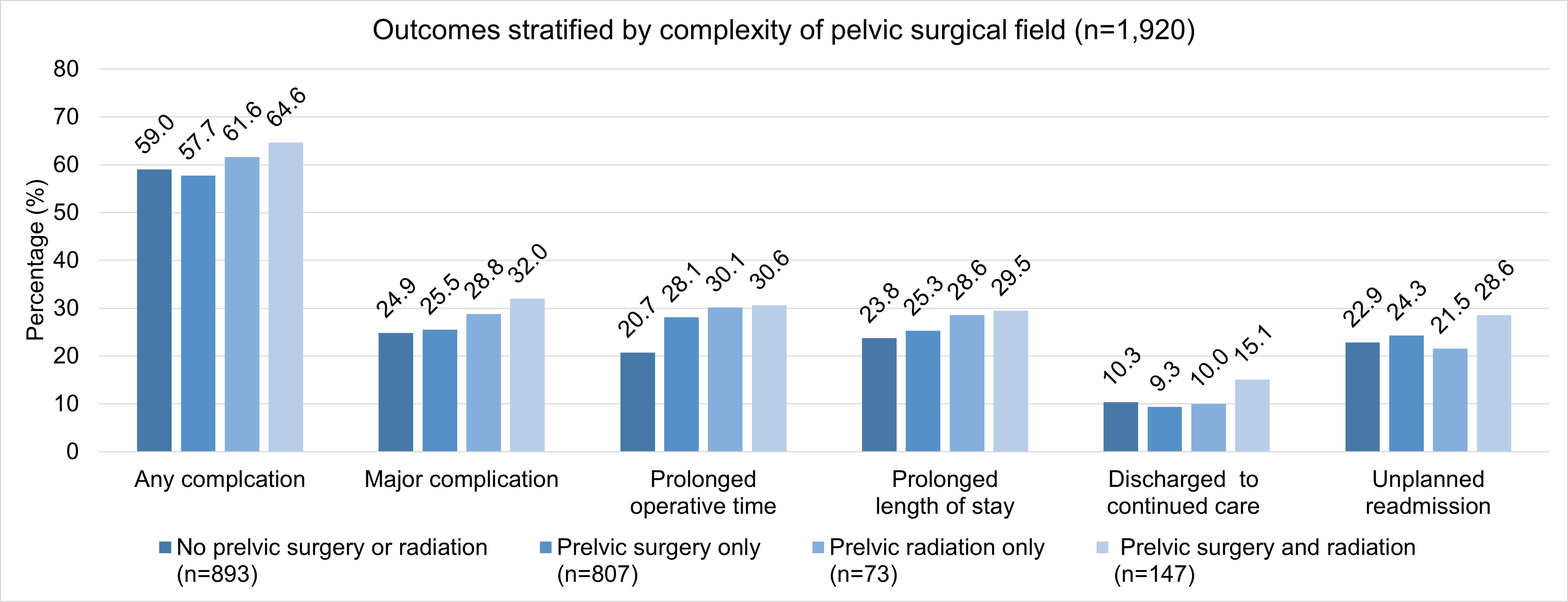Back
Poster, Podium & Video Sessions
Moderated Poster
MP13: Health Services Research: Practice Patterns, Quality of Life and Shared Decision Making I
MP13-13: Association between Complexity of Pelvic Surgical Field and Outcomes of Radical Cystectomy with Urinary Diversion
Friday, May 13, 2022
2:45 PM – 4:00 PM
Location: Room 228
Leilei Xia*, Raju Chelluri, Ruchika Talwar, Daniel Lee, Thomas Guzzo, Philadelphia, PA

Leilei Xia, MD
Resident
University of Southern California
Poster Presenter(s)
Introduction: Surgical field can be complicated by prior pelvic surgery or radiation for patients undergoing radical cystectomy (RC) with urinary diversion (UD). However, whether the complexity of pelvic surgical field leads to worse perioperative outcomes is not well reported in the literature.
Methods: Patients who underwent RC and UD were identified from the 2019 National Surgical Quality Improvement Program (NSQIP) database. Pelvic surgical field complexity was categorized into 4 groups based on prior history of pelvic surgery and/or radiation: no pelvic surgery or radiation (n=893), pelvic surgery only (n=807), pelvic radiation only (n=73), pelvic surgery and radiation (n=147). Outcomes of interest were derived from NSQIP outcomes within 30 days from surgery and included: any complications, major complications, prolonged operative time (pOT, =400 min), prolonged length of stay (pLOS, =9 d), discharged to continued care, and unplanned readmission.
Results: A total of 1,920 patients (ileal conduit = 1,628, neobladder = 292) were included; 22.9% had robotic approach and 36.4% had preoperative chemotherapy. Overall complication rate in the cohort was 59% and major complication rate was 25.8 %. The outcomes stratified by the complexity of pelvic surgical field are shown in the Figure. Multivariable logistic regression showed that compared with no pelvic surgery or radiation, pelvic surgery only (odds ratio [OR]=1.43, 95% confidence interval [CI]=1.13-1.81, P=0.003) and pelvic radiation only (OR=1.98, 95%CI=1.13-3.46, P=0.016) were associated with higher odds of pOT but not other outcomes. Pelvic surgery and radiation group was associated with higher odds of major complications (OR=1.47, 95%CI=1.00-2.16, P=0.052), pOT (OR=1.84, 95%CI=1.22-2.77, P=0.004), and pLOS (OR=1.49, 95%CI=1.00-2.24, P=0.049).
Conclusions: This is the first national study focusing on the complexity of pelvic surgical field and outcomes of RC. This NSQIP study, although limited by sample size, showed increased complexity of pelvic surgical field was associated with longer OT, longer hospital stays, and likely higher complication rates. Our study will add to literature improving patient counseling for a group of challenging bladder cancer patients who had prior history of pelvic surgery and pelvic radiation, especially those who had both.
Source of Funding: None

Methods: Patients who underwent RC and UD were identified from the 2019 National Surgical Quality Improvement Program (NSQIP) database. Pelvic surgical field complexity was categorized into 4 groups based on prior history of pelvic surgery and/or radiation: no pelvic surgery or radiation (n=893), pelvic surgery only (n=807), pelvic radiation only (n=73), pelvic surgery and radiation (n=147). Outcomes of interest were derived from NSQIP outcomes within 30 days from surgery and included: any complications, major complications, prolonged operative time (pOT, =400 min), prolonged length of stay (pLOS, =9 d), discharged to continued care, and unplanned readmission.
Results: A total of 1,920 patients (ileal conduit = 1,628, neobladder = 292) were included; 22.9% had robotic approach and 36.4% had preoperative chemotherapy. Overall complication rate in the cohort was 59% and major complication rate was 25.8 %. The outcomes stratified by the complexity of pelvic surgical field are shown in the Figure. Multivariable logistic regression showed that compared with no pelvic surgery or radiation, pelvic surgery only (odds ratio [OR]=1.43, 95% confidence interval [CI]=1.13-1.81, P=0.003) and pelvic radiation only (OR=1.98, 95%CI=1.13-3.46, P=0.016) were associated with higher odds of pOT but not other outcomes. Pelvic surgery and radiation group was associated with higher odds of major complications (OR=1.47, 95%CI=1.00-2.16, P=0.052), pOT (OR=1.84, 95%CI=1.22-2.77, P=0.004), and pLOS (OR=1.49, 95%CI=1.00-2.24, P=0.049).
Conclusions: This is the first national study focusing on the complexity of pelvic surgical field and outcomes of RC. This NSQIP study, although limited by sample size, showed increased complexity of pelvic surgical field was associated with longer OT, longer hospital stays, and likely higher complication rates. Our study will add to literature improving patient counseling for a group of challenging bladder cancer patients who had prior history of pelvic surgery and pelvic radiation, especially those who had both.
Source of Funding: None


.jpg)
.jpg)